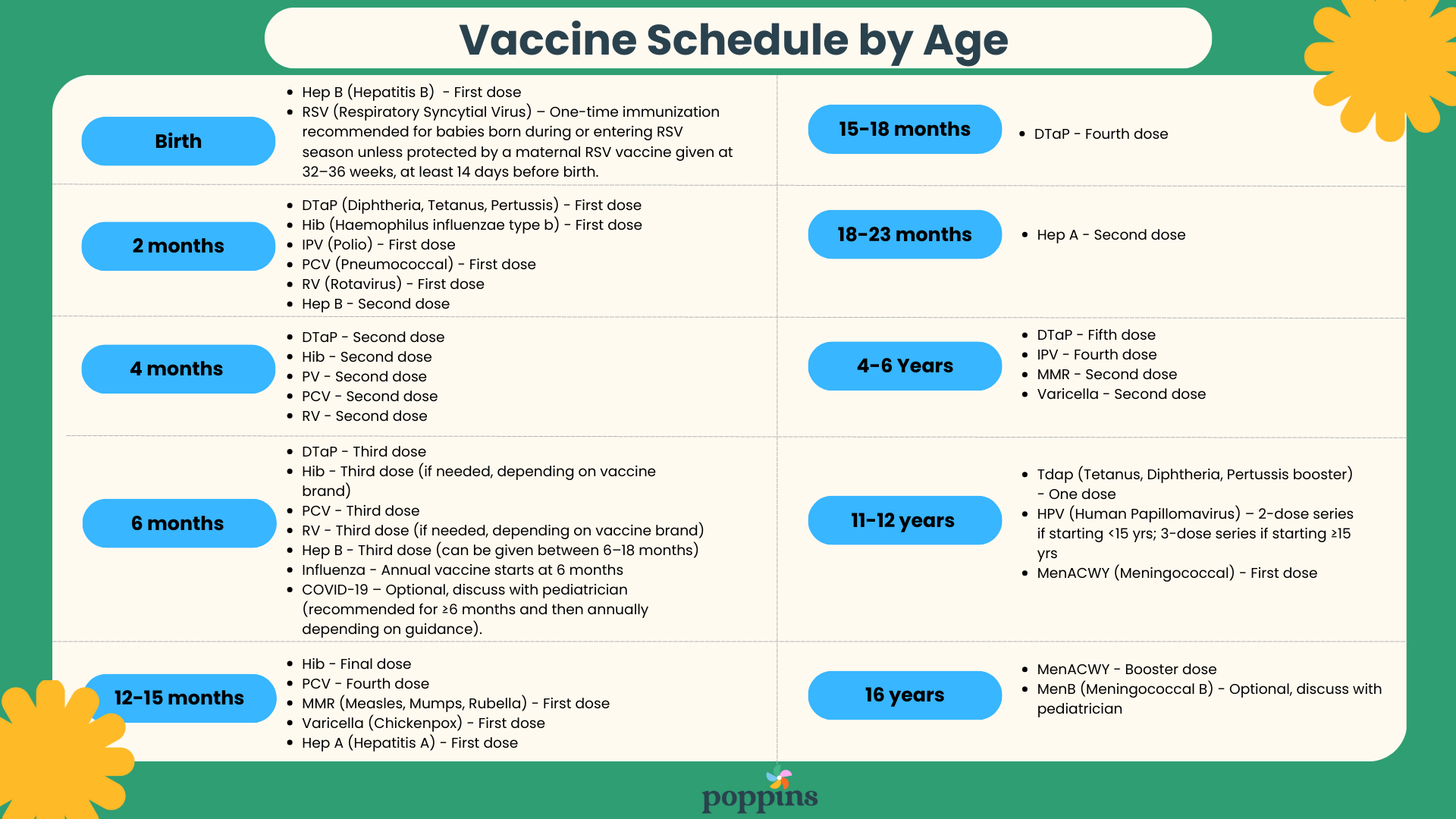
Let's cut to the chase: vaccine conversations happen everywhere—pediatrician offices, playgroups, and those late-night searches when you have questions about your child's upcoming appointment. Having questions is completely normal. What's not normal is the amount of conflicting information coming at you from every direction.
At Poppins, we're not here to sugarcoat or overwhelm you with medical jargon. We're here to give you the evidence-based facts you need to make informed decisions for your family.
Why Vaccines Work (And Why That Matters)
Think of vaccines as giving your child's immune system a practice round before the real game. They train your child's body to recognize and fight specific germs without causing the actual illness. It's like showing the bouncer a photo of the troublemaker before they try to crash the party.
The results speak for themselves: vaccines prevent 3.5 to 5 million deaths worldwide each year. Polio has been eradicated in the U.S. since 1979. Measles deaths dropped 73% globally between 2000 and 2018. These aren't just numbers—they represent millions of children who grew up healthy instead of battling preventable diseases.
The Natural Immunity Question
Some parents wonder if it's better for their child to get the disease and develop "natural immunity." Here's the honest answer: while natural infection can create immunity, it comes with potentially devastating risks—severe illness, life-altering complications, or death.
Vaccines give you the immunity benefits by taking the luck out of it. They control:
- The dose: Smallest amount needed for protection
- The timing: Before your child hits high-risk periods
- The severity: Extremely rare chance of serious reactions vs. real disease complications
Your Complete Vaccine Schedule: Birth to Adolescence
Here's exactly what vaccines your child needs and when, based on the American Academy of Pediatrics (AAP) Recommended Child and Adolescent Immunization Schedule:

Note: In January 2026, federal/CDC guidance changed how some vaccines are categorized; Poppins continues to follow AAP’s evidence-based immunization schedule.
Safety: What Actually Happens Before That Shot
Nothing matters more than your child's safety. Here's what happens before any vaccine reaches your pediatrician's office:
Before approval: Multiple clinical trial phases testing safety and effectiveness in thousands of participants.
After approval: Real-time monitoring through systems like VAERS and the Vaccine Safety Datalink that catch even rare side effects.
The reality of side effects: Most are mild—soreness, redness, swelling at injection site, plus fever, fussiness, or fatigue. Severe allergic reactions occur in approximately 1 in a million doses.
The Questions That Keep Parents Up at Night
Let's address what you're actually worried about:
"Why so many shots when they're so young?"
Infants face the highest risk for serious illness. The schedule is carefully timed for maximum protection when kids are most vulnerable. Delaying just leaves them exposed longer.
"Can vaccines overwhelm the immune system?"
Your child's immune system handles thousands of germs daily. Even when given together, vaccines use less than 0.1% of their immune capacity. It's like worrying that a drop of water will overflow a swimming pool.
"Do vaccines cause autism?"
More than a dozen large studies involving millions of children show no link between vaccines and autism spectrum disorder. This question has been thoroughly researched and definitively answered.
"What about fevers after shots?"
Normal and short-lived. These are signs the immune system is learning—exactly what we want to happen.
What's Making Headlines Right Now
Measles Outbreaks: The U.S. saw a major surge in 2025 (2,144 confirmed cases), with outbreaks occurring when measles reaches pockets of under-vaccinated communities. Measles isn't just a rash—it can cause brain damage, hearing loss, and death
Flu Vaccine: The AAP continues to recommend an annual flu vaccine for all children 6 months and older. Yes, even if last year's didn't seem to work perfectly—it's still your best defense.
COVID Vaccine:Recommended by the AAP starting at 6 months. Dosing depends on age and prior vaccination status. The virus keeps evolving, and so do our defenses.
Delaying Shots: Alternative schedules don't improve safety—they just leave kids vulnerable longer. The recommended immunization schedule isn't random timing pulled out of thin air. It's carefully designed based on decades of research about when children are most vulnerable and when their immune systems respond best. Staying on schedule keeps kids protected during those high-risk windows and helps safeguard the community, especially infants and children who can't yet be fully vaccinated.
When to Get Extra Support
Vaccine decisions can feel overwhelming, especially when you're managing conflicting information from every direction. At Poppins, our pediatric clinicians are available 24/7 via text to answer your specific questions, address concerns, and help you navigate decisions that feel right for your family.
Whether you're dealing with pre-appointment anxiety or post-vaccine concerns, you don't have to figure this out alone.
Got Questions? Ask Our Clinical Team
Still have concerns about vaccines? Wrestling with timing or side effects? Wondering what's right for your specific situation? Our Poppins clinical team is here to help.
Text us your vaccine questions anytime—whether it's 2 PM or 2 AM when those worries hit. Our pediatric clinicians will give you personalized, evidence-based answers that actually address your concerns, not generic responses you could find on any website.
According to Aly Insull, Pediatric Nurse Practitioner at Poppins, "At the end of the day, every parent wants to make the best decision for their child. When you have good information and trusted support, that decision becomes much clearer."
Poppins is here for all your vaccine questions, from that first hepatitis B shot to navigating school requirements. No question is too basic, too complex, or too urgent.
The Bottom Line
The science is solid, the safety record is strong, and the protection is real. You have the power to make informed decisions about your child's health. When you have accurate information and trusted support, those decisions become much clearer.
Trust the research, trust your pediatric team, and trust yourself to make the right choice for your family. And remember—when questions come up, you don't have to navigate complex medical decisions solo. That's exactly what we're here for.



